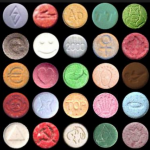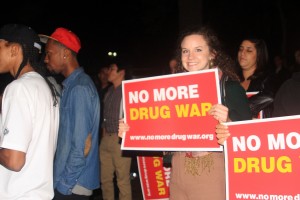
Elevated self-criticism is associated with a range of psychological disorders (including depression, generalised anxiety disorder, post-traumatic stress disorder (PTSD), social phobia) and is a risk for psychopathology after stressful life events.
Therapeutic approaches that improve self-compassion in order to mitigate the effects of critical self-evaluation have been shown to be effective treatments for several disorders (e.g. anxiety and depression).
One such intervention is compassion-based therapy which uses compassionate imagery (CI) to direct benevolent feelings towards the self. One obstacle to the success of this treatment is that the ability to direct self-compassion to oneself may be compromised in disorders associated with negative self-referential thinking. This means that the patient must be extensively trained to be able to direct compassionate thoughts towards themselves.
It has been argued that the use of psychedelic drugs such psilocybin may offer an useful adjunct to self-compassion interventions as they offer “short cuts” to insights into the self without years of mind training. The entactogen 3,4-methylenedioxy-N-methylamphetamine (MDMA, or “ecstasy”) has been highlighted as another drug that may improve self-compassion as its recreational use can produce feelings of closeness or connection with others. If MDMA can facilitate the ability to be compassionate towards oneself, as well as others, it may prove useful in a therapeutic context.
The current study aimed to investigate whether the documented effects of MDMA can extend to intrapersonal (i.e. taking place or existing within the mind) attitudes like self-criticism and self-compassion. The authors use a ‘repeated measures naturalistic experimental design’ to investigate the effect compassionate imagery (CI) and MDMA has on self-criticism and self-compassion.

The recreational use of ecstasy is well known for producing feelings of closeness or connection with others.
Methods
Twenty participants (7 female) completed a within-subjects naturalistic study. In both sessions participants completed a compassionate imagery task, but in one session participants consumed MDMA and in the other they consumed nothing. Participants informed the experimenters when they intended to take MDMA and the experimenters visited their homes to administer testing sessions.
At the start of each testing session (T1) participants completed mood assessment questionnaires (PANAS & TPAS) and then completed the state self-compassion and self-criticism scale (SCCS). The SCCS involves participants imagining self-threatening scenarios after which they rate their reaction towards themselves, the scenarios are designed to produce negative self-referential thinking and the scale produces two scores: Self-criticism and Self-compassion. Attachment-related avoidance and trait self-criticism were also measured as possible moderators of the effects of MDMA and CI.
In the active drug session participants took MDMA and when they believed they were experiencing “peak effects” (40+13mins) they completed another PANAS, TPAS and SCCS (T2). Immediately after this participants completed a compassionate imagery task (18 mins in duration) before repeating the PANAS, TPAS and SCCS for a final time (T3). Control sessions were identical but MDMA was not consumed.

This small naturalistic experimental study investigates what effect compassionate imagery and MDMA have on self-criticism and self-compassion.
Results
Effects of MDMA and CI on MDMA related mood/symptoms of use:
- MDMA significantly increased euphoria, sensitivity to colours, and jaw clenching
- Both MDMA and CI increased “wanting to be with others”.
Effects of MDMA and CI on affect:
- MDMA produced a non-significant trend increase in the “active” positive affect subscale of the TPAS between T1 and T2
- The “relaxed” and “warm” TPAS subscales and PANAS positive affect scale were unaffected
- Negative affect measured by the PANAS reduced across both sessions.
Effects of MDMA and CI on state self-criticism and self-compassion
- MDMA decreased self-criticism between T1 and T2 (p<.0001) and further between T2 and T3 (i.e. with the additional effect of CI; p=.027)
- In the control session, CI significantly reduced self-criticism (p=.015)
- Critically, the effect of MDMA + CI was greater than CI alone
- There were no robust effects of MDMA and CI on self-compassion.
Moderating the effects of MDMA and CI
- Participants with high attachment avoidance showed significant increases in self-compassion between T1 and T2 (p<.0001) and further increases between T2 and T3 in the MDMA session
- There were small increases in self-compassion following CI in both groups in the control session
- Attachment styles did not moderate the effects of MDMA or CI on self-criticism.

When used together, MDMA (ecstasy) and CI (compassionate imagery) decreased self-criticism more than CI alone.
Discussion
This current investigation suggests that MDMA alone, and in combination with CI, may serve to reduce self-criticism (but not self-compassion), although effects on self-compassion may be evident in certain groups (those with attachment-related avoidance).
Limitations
This study does have some notable limitations:
- Participants had to supply the drug themselves. This means dosing and indeed actual content of the drug consumed is unknown (other drugs such as MDEA could be present).
- Participants were a non-clinical sample, so it is not known whether reductions is self-criticism can be extrapolated to clinical samples.
Conclusions
The current paper is attempting to establish an evidence base to justify conducting randomised controlled trials into the use of MDMA as an adjunct to CI. To carry out further studies, a convincing evidence base must be built, so the question is does this study achieve that?
The authors are in an impossible situation and are hostages to UK drug laws. They have done a lot to control for as much as possible in this naturalistic study, but the use of street drugs means that we cannot be certain of any of the findings. Indeed, more research such as this may help make baby steps towards RCTs, but until UK drug laws are changed, the obstacles to understanding the therapeutic benefits of substances such as MDMA may be near insurmountable.

UK drug laws make research into ecstasy and other street drugs extremely difficult.
Links
Primary paper
Kamboj SK et al. (2015) Recreational 3,4-methylenedioxy-N-methylamphetamine (MDMA) or ‘ecstasy’ and self-focused compassion: Preliminary steps in the development of a therapeutic psychopharmacology of contemplative practices. J Psychopharmacol. 2015 May 18. pii: 0269881115587143. [PubMed abstract]
Other references
Evans J, Heron J, Lewis G, Araya R, Wolke D; ALSPAC study team. (2005) Negative self-schemas and the onset of depression in women: longitudinal study. Br J Psychiatry. 2005 Apr;186:302-7. [PubMed abstract]
Henning ER, Turk CL, Mennin DS, Fresco DM, Heimberg RG. (2007) Impairment and quality of life in individuals with generalized anxiety disorder. Depress Anxiety. 2007;24(5):342-9. [PubMed abstract]
Kashdan TB, Breen WE, Julian T. (2010) Everyday strivings in war veterans with posttraumatic stress disorder: suffering from a hyper-focus on avoidance and emotion regulation. Behav Ther. 2010 Sep;41(3):350-63. doi: 10.1016/j.beth.2009.09.003. Epub 2010 Feb 11. [PubMed abstract]
Acarturk C1, Smit F, de Graaf R, van Straten A, ten Have M, Cuijpers P. (2009) Incidence of social phobia and identification of its risk indicators: a model for prevention. Acta Psychiatr Scand. 2009 Jan;119(1):62-70. doi: 10.1111/j.1600-0447.2008.01275.x. Epub 2008 Oct 6. [PubMed abstract]
Van Dam NT, Sheppard SC, Forsyth JP, Earleywine M. (2011) Self-compassion is a better predictor than mindfulness of symptom severity and quality of life in mixed anxiety and depression. Journal of Anxiety Disorders, Volume 25, Issue 1, Pages 123-130. [Abstract]

Can MDMA and compassionate imagery therapy help increase self-compassion? https://t.co/xhtXGx1wFq #MentalHealth https://t.co/qFcvoPSn0h
Morning @UCL_CPU You might like to read @ChristiansenLiv’s blog today https://t.co/MpkNjaOarY #MDMA #CompassionateImagery
The book Brave New World is extraordinarily prescient. The Alphas run the country distributing happy drugs to dissenters.
Today @ChristiansenLiv Researching the therapeutic benefits of illegal drugs is hard! https://t.co/MpkNjaOarY #ecstasy
My latest @Mental_Elf offering- The therapeutic benefits of MDMA- not easy to test due to UK drug laws https://t.co/7tndMzRjw7
Interesting paper by my old friend Sunjeev (Kamboj) – I would just remark that the negative consequences of Ecstasy for some have been almost systemically ignored against the assumed weight of ‘bliss’ e.g. “Hug Drug or Thug Drug” http://keithsneuroblog.blogspot.co.uk/2012/08/hug-drug-or-thug-drug.html
or perhaps some simply forget https://www.researchgate.net/profile/Keith_Laws/publication/6217290_Ecstasy_%28MDMA%29_and_memory_function_a_meta-analytic_update/links/0912f50ac0767479f0000000.pdf
Morning @profhrs Interested in your thoughts on @ChristiansenLiv’s blog about #MDMA & #CompassionateImagery https://t.co/MpkNjaOarY
Hi @Mental_Elf @profhrs @ChristiansenLiv The best evidence on harms/benefits will come from RCTs. ’til then, baby steps, as Paul C suggests!
@Mental_Elf blog on our #Compassion #Imagery and #MDMA paper!
https://t.co/BH3ikbldNK
Is it common that participants have to supply their own illegal substances? How can one possibly determine a generalisable effect with no idea of content or dosing?
Should we update UK drug laws to open the door to research into therapeutic benefits of illegal substances? https://t.co/MpkNjaOarY
@Mental_Elf Ask @ProfDavidNutt
@Mental_Elf people often choose street drugs because they have fewer side effects. A study of supervised use could be informative.
Can MDMA and compassionate imagery therapy help increase self-compassion? https://t.co/RbdLa6wfac
RT @Mental_Elf: Can MDMA (ecstasy) and compassionate imagery therapy help increase self-compassion? https://t.co/858T1g5f46
@DrDannyPenman @Mental_Elf The simulacrum of elevated consciousness produced by drugs only makes the real thing that much harder to achieve.
@Mental_Elf possibly but not in my life time, it’s so restricted now and the illegal stuff isn’t really MDMA any more is it
Can MDMA and compassionate imagery therapy help increase self-compassion? https://t.co/kz0NLl2tpg
Don’t miss: Can MDMA (ecstasy) and compassionate imagery therapy help increase self-compassion? https://t.co/MpkNjaOarY
@Mental_Elf it certainly worked at a festival in the late 90’s !
@BadHousesOfBrit @Mental_Elf ??
I was always in the hacienda in Manchester so I would say so lol. It did change my outlook.on things tbh ?
@janemeeps @Mental_Elf SW1 in London for me. Not a massive fan of shallow fun nowadays, but it gave insights, people wanted to share hearts
Can MDMA and compassionate imagery therapy help increase self-compassion? https://t.co/VS2AUSFVUW via @sharethis